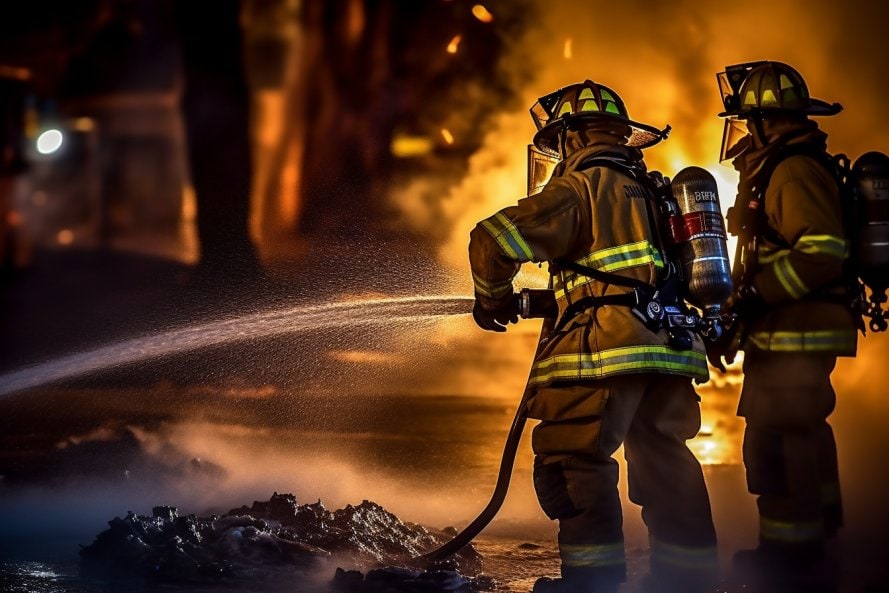Do Volunteer Firefighters Get Paid? The Truth About Volunteer Firefighting
When a fire engine roars down the street, most people assume that the firefighters inside are all full-time professionals. But in much of America, this is far from reality. In fact, according to the National Volunteer Fire Council (NVFC), nearly 65% of firefighters in the United States are volunteers. These dedicated men and women balance careers, family life, and personal commitments while also answering the call to serve their communities.
That leads to one of the most common questions people ask: Do volunteer firefighters get paid?
The answer is not as simple as “yes” or “no.” While volunteer firefighters usually don’t receive salaries, there are a variety of forms of compensation, both financial and non-financial, that can make the role rewarding. In this article, we’ll explore the truth about volunteer firefighting, from pay structures to benefits, motivations, and the future of this critical service.
Table of Contents:
- What Is a Volunteer Firefighter?
- Do Volunteer Firefighters Get Paid?
- Different Types of Compensation
- What Benefits Do Volunteer Firefighters Receive?
- Why Do People Become Volunteer Firefighters?
- Challenges Faced by Volunteer Firefighters
- How to Become a Volunteer Firefighter
- The Future of Volunteer Firefighting
- 5 Common Questions About Volunteer Firefighters
- Conclusion and Call to Action
What Is a Volunteer Firefighter?
A volunteer firefighter is a community member who provides fire protection, rescue operations, and emergency response services without being employed as a full-time, salaried firefighter.
Volunteer departments are especially common in small towns, rural areas, and suburban regions where municipal budgets cannot support full-time fire crews. These volunteers train to professional standards, commit to weekly drills, and respond to emergency calls 24/7 often leaving their jobs, meals, or family gatherings at a moment’s notice.
Their duties include:
- Responding to fires, car accidents, and hazardous material incidents
- Assisting with medical emergencies and providing first aid
- Conducting search and rescue missions
- Supporting disaster relief efforts such as floods, tornadoes, or wildfires
- Educating communities on fire prevention and safety
Do Volunteer Firefighters Get Paid?
The straightforward truth is that most people do not earn a traditional salary. Unlike career firefighters, who are hired by city or county fire departments and receive full wages, benefits, and pensions, volunteers are not classified as full-time employees. They are community members, teachers, mechanics, office workers, and business owners who dedicate their free time to protecting their neighbors.
But here’s where things get more nuanced: “not paid” does not mean “no compensation at all.” While the majority of volunteer fire departments operate on limited budgets and cannot afford payroll, many have developed ways to provide small financial incentives or support programs to recognize the sacrifices their volunteers make.

Let’s break this down:
- A firefighter may earn $10–$20 per hour while on duty.
- Some towns pay a fixed weekly or monthly stipend, typically between $100–$300, as a token of appreciation.
While these amounts won’t replace a full-time income, they help offset lost wages if a volunteer must leave work or family time to respond to an emergency.
2. Per-Call Payments
In many small towns, volunteers receive per-call reimbursements. That means whenever they respond to an alarm, whether it’s a house fire, car crash, or medical emergency, they receive a flat rate.
Typical per-call amounts range from $15 to $50, depending on the length and severity of the incident. Some departments even scale the payment: smaller calls (like a smoke alarm reset) may pay less, while major incidents requiring hours on-scene may pay more.
3. Expense Reimbursements
- Fuel and mileage
- Uniform expenses
- Training and certification fees
- Meals during long operations
This ensures volunteers don’t lose money while serving.
4. Tax Credits or Incentives
Some states and municipalities recognize the financial strain on volunteers and provide tax breaks as a reward for service.
For example:
- New York State offers an income tax credit for volunteer firefighters and ambulance workers who meet service requirements.
- Pennsylvania provides property tax rebates for active volunteers.
- Other states reduce local taxes or waive specific fees for those who actively serve.
Although these incentives may not directly feel like a paycheck, they provide measurable financial relief.
5. Pension Credits for Long-Term Service
- For example, a firefighter who volunteers for 20+ years may receive a monthly payment after retirement. This not only rewards dedication but also encourages volunteers to remain active long-term.
Different Types of Compensation
Since this is one of the most misunderstood areas, let’s break down the different forms of compensation that exist for volunteer firefighters:

Some fire departments provide volunteers with a flat rate per emergency. For example, $20 for responding to a fire or $15 for attending a training session. Larger calls that require hours of service may include slightly higher stipends.
2. Hourly or Shift Pay
In certain regions, volunteers may sign up for on-call shifts and receive a small hourly wage (often minimum wage or less) when actively covering the station.
3. Reimbursements
Departments often reimburse expenses for fuel, uniforms, or travel. This ensures volunteers aren’t losing money while serving.
4. Tax Incentives
Some states offer tax deductions or credits for volunteer firefighters. For example, Pennsylvania and New York both provide income tax benefits for certified volunteer responders.
5. Retirement Programs
Long-term volunteers may qualify for pension or retirement benefit programs, often based on years of service. These programs vary widely but can be an essential incentive to encourage retention.
6. Indirect Benefits
What Benefits Do Volunteer Firefighters Receive?
Even if the paycheck is small or nonexistent, volunteer firefighters enjoy a range of non-monetary rewards.
Training and Education
Volunteer firefighters receive the same level of fire academy training as career firefighters, often funded by the department. Certifications may include:
- Firefighter I and II
- Emergency Medical Technician (EMT)
- Hazardous Materials Operations
- Search and Rescue
This training is not only valuable for firefighting but can also open doors to careers in emergency services, law enforcement, or disaster management.
Insurance and Workers’ Compensation

Most volunteer firefighters are covered by workers’ compensation if injured on duty. Many departments also provide life insurance policies for active members.
Community Respect
Being a volunteer firefighter is one of the most respected community roles. Volunteers earn admiration for their courage and sacrifice.
Retirement Credits
Some states provide length-of-service awards programs (LOSAPs) that contribute to retirement savings based on volunteer years.
Networking and Brotherhood
Why Do People Become Volunteer Firefighters?
- Service to Community – Volunteers want to protect their neighbors and give back.
- Personal Fulfillment – The pride of saving lives and property cannot be measured in dollars.
- Skill Development – Training provides valuable skills applicable to many professions.
- Career Pathway – Many career firefighters begin as volunteers, using the role as a stepping stone.
- Sense of Belonging – The firehouse becomes a second family, offering teamwork and support.
Challenges Faced by Volunteer Firefighters
While rewarding, volunteer firefighting also comes with challenges:
- Time Demands – Volunteers must balance family, jobs, and fire calls.
- Financial Burden – Without full salaries, many cover personal expenses out of pocket.
- Recruitment Decline – Nationwide, fewer people are signing up, putting strain on existing volunteers.
- Increased Call Volumes – Modern fire departments respond to more medical emergencies than fires, stretching volunteers thin.
- Rigorous Training – The time commitment for training can be daunting, especially for those with full-time jobs.
How to Become a Volunteer Firefighter
For those interested, the process generally follows these steps:
- Apply at Your Local Fire Department – Contact the fire chief or recruitment officer.
- Meet Basic Requirements – Usually 18 years old, with a valid driver’s license and a clean record.
- Pass Physical and Background Checks – Ensuring fitness and trustworthiness.
- Complete Training – Fire academies or in-house training prepare recruits for duty.
- Commit to Ongoing Service – Attend weekly drills, meetings, and be available for calls.
The Future of Volunteer Firefighting
On the one hand, communities still rely heavily on volunteers. Without them, many small towns would lack emergency coverage entirely. On the other hand, declining numbers and increased demands threaten the sustainability of this system.
Potential solutions include:
- Enhanced Incentives – More tax breaks, stipends, and retirement programs.
- Public Awareness Campaigns – Educating citizens about the role of volunteers.
- Partnerships with Career Firefighters – Combining forces to share resources.
- Grant Funding – Federal and state programs to support training, gear, and recruitment.
5 Common Questions About Volunteer Firefighters
Most do not receive salaries. Some get modest stipends, per-call payments, or tax incentives.
2. Do volunteer firefighters get the same training as professionals?
Yes. Volunteers often complete state-certified programs, ensuring they meet the same standards as career firefighters.
3. Can volunteer firefighting lead to a full-time career?
Definitely, many career firefighters started as volunteers, using the experience to secure full-time employment.
4. Do volunteer firefighters get retirement benefits?
In some states, yes. Programs like LOSAP provide retirement stipends or pension credits.
5. Why are volunteer firefighters so important?
Conclusion and Call to Action
The truth is: while most do not receive a paycheck in the traditional sense, they are compensated in other ways through stipends, training, retirement credits, and above all, the immeasurable reward of serving their communities.
Volunteer firefighters represent the heart of public service: ordinary people doing extraordinary things. Their dedication, bravery, and sacrifice keep towns and neighborhoods safe every single day.

👉 At Eaton Fire, we honor and support volunteer firefighters everywhere. If you or someone you know has been impacted by fire, whether through loss, insurance claims, or recovery needs, Contact Eaton Fire today for a free consultation. Together, we’ll help you rebuild stronger and safer.

